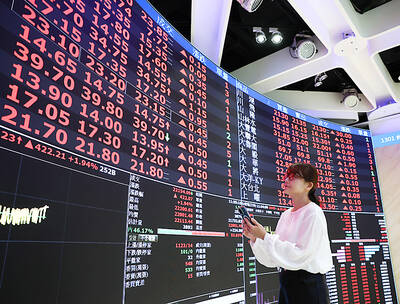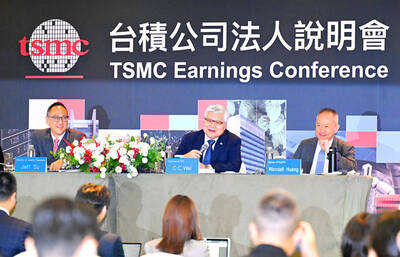CSBC Corp, Taiwan (CSBC, 台灣國際造船), the nation’s largest ship manufacturer, said yesterday that the preliminary income losses from canceled orders by Israeli client Zim Integrated Shipping Services Ltd were estimated to reach NT$1 billion (U$29.5 million) this year.
The Kaohsiung-based company said it expected to book more than NT$1 billion in losses next year as a result of the cancelation, while adding that the turn of events would not affect its business next year through 2012.
“We are in the midst of soliciting new contract orders from international customers, as well as participating in government projects to even out our revenue stream,” Lee Shu-ling (李叔麟), chief secretary of the board of directors at CSBC, told the Taipei Times by telephone yesterday.
Furthermore, CSBC is working on the Taiwanese navy’s coastal defense ships, Lee said.
As part of the penalty clause included in the contract with Zim, the Israeli company will be forfeiting the 10 percent deposit it made on six 1,700-TEU (20-foot equivalent unit) container vessels as well as any associated raw material costs CSBC has incurred so far in the production of the vessels.
Lee said the company had yet to begin work on the vessels. Work had been expected to begin at its Keelung production site in November.
In a statement to the Taiwan Stock Exchange on Tuesday, CSBC informed investors of the canceled order totaling US$220.4 million. As a result of the cancelation, CSBC now has 52 orders on its books.
Last year, CSBC’s revenues reached NT$35.65 billion, a year-on-year increase of 22.4 percent. Earnings last year reached 1.07 billion, an earnings per share estimated at NT$1.61.
At the company’s pre-IPO road show in December, CSBC chairman Cheng Wen-lon (鄭文隆) said revenue this year would be between NT$35 billion and NT$38 billion, with profit estimated at between NT$2.2 billion and NT$2.4 billion, taking into account declining steel prices and favorable exchange rates.
At the time, Cheng said the shipbuilder was fully booked until 2012.
Lee refused to confirm those figures yesterday.
Despite early downward trading in the morning, CSBC shares closed up NT$0.55, or 1.77 percent, to NT$28.80 on the Taiwan Stock Exchange.
CSBC mainly builds container vessels, oil tankers, bulk carriers, naval ships and oil drilling rigs. Its other business lines include commercial and naval ship repairs, machinery production engineering and smoke stacks for power plants.
The company has enjoyed the most successful turnaround among all of Taiwan’s state-owned companies, with pre-tax income of NT$2.5 billion in 2007, surpassing its budget target by NT$31 million.
In December, CSBC unveiled a plan to expand its ship repair services to meet a possible rise in repair demand following the opening of direct shipping links with China on Dec. 15.
ADDITIONAL REPORTING BY CNA

UNCERTAINTIES: Exports surged 34.1% and private investment grew 7.03% to outpace expectations in the first half, although US tariffs could stall momentum The Chung-Hua Institution for Economic Research (CIER, 中華經濟研究院) yesterday raised its GDP growth forecast to 3.05 percent this year on a robust first-half performance, but warned that US tariff threats and external uncertainty could stall momentum in the second half of the year. “The first half proved exceptionally strong, allowing room for optimism,” CIER president Lien Hsien-ming (連賢明) said. “But the growth momentum may slow moving forward due to US tariffs.” The tariff threat poses definite downside risks, although the scale of the impact remains unclear given the unpredictability of US President Donald Trump’s policies, Lien said. Despite the headwinds, Taiwan is likely

READY TO BUY: Shortly after Nvidia announced the approval, Chinese firms scrambled to order the H20 GPUs, which the company must send to the US government for approval Nvidia Corp chief executive officer Jensen Huang (黃仁勳) late on Monday said the technology giant has won approval from US President Donald Trump’s administration to sell its advanced H20 graphics processing units (GPUs) used to develop artificial intelligence (AI) to China. The news came in a company blog post late on Monday and Huang also spoke about the coup on China’s state-run China Global Television Network in remarks shown on X. “The US government has assured Nvidia that licenses will be granted, and Nvidia hopes to start deliveries soon,” the post said. “Today, I’m announcing that the US government has approved for us

The National Stabilization Fund (NSF, 國安基金) is to continue supporting local shares, as uncertainties in international politics and the economy could affect Taiwanese industries’ global deployment and corporate profits, as well as affect stock movement and investor confidence, the Ministry of Finance said in a statement yesterday. The NT$500 billion (US$17.1 billion) fund would remain active in the stock market as the US’ tariff measures have not yet been fully finalized, which would drive international capital flows and global supply chain restructuring, the ministry said after the a meeting of the fund’s steering committee. Along with ongoing geopolitical risks and an unfavorable

DEMAND: The forecast did not factor in potential increases from lifted US restrictions on Nvidia’s H20 chips to China, which TSMC CEO C.C. Wei described as ‘good news’ Taiwan Semiconductor Manufacturing Co (TSMC, 台積電), a major chip supplier to Nvidia Corp, yesterday raised its revenue growth forecast for this year to 30 percent in US dollar terms, thanks to exceptionally strong demand for artificial intelligence (AI) and high-performance computing (HPC) applications. The new revenue growth forecast surpasses the 25 percent expansion estimated by TSMC three months ago and beat almost all industry analysts’ expectations. Booming AI demand helped propel the chipmaker’s net profit by 60.7 percent last quarter to a record high of NT$398.27 billion (US$13.54 billion), from NT$247.85 billion a year earlier. That represented a sequential increase of 10.2